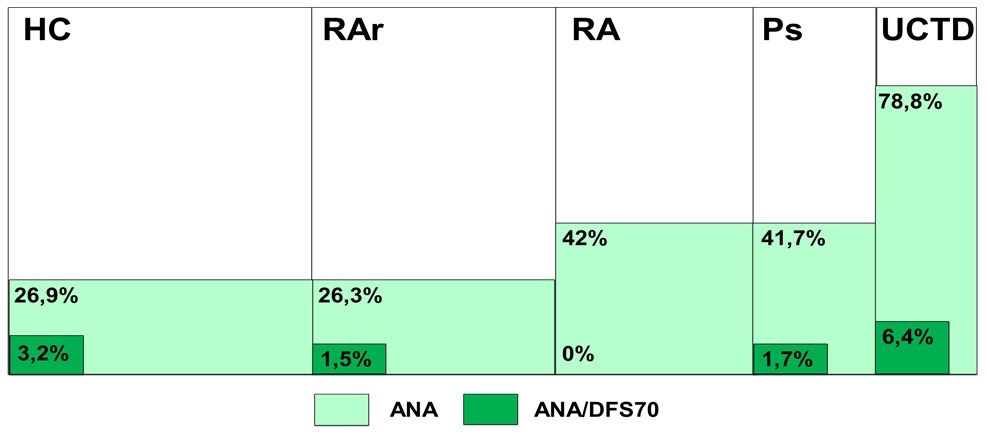Session Information
Date: Saturday, November 7, 2020
Title: Epidemiology & Public Health Poster II: OA, Osteoporosis, & Other Rheumatic Disease
Session Type: Poster Session B
Session Time: 9:00AM-11:00AM
Background/Purpose: Autoimmune systemic rheumatic disease (SARD) diagnostic approach is complex and recently there are some diagnostic tools to rule-out autoimmune disease diagnoses. ANAS/DFS70 antibodies have attracted interest as a positive result in patients without clinical evidence of SARD, but we are scarce on data validation in Latin American countries population. The objective of this study was to assess ANA/DFS70 performance in a large population with SARD compared with first degree relatives and healthy controls.
Methods: A cross-sectional study was conducted. We analyzed 531 individuals between 18-65 years old, 101 early rheumatoid arthritis (eRA) patients (ACR/EULAR 2010 classification criteria), 137 first degree relatives (FDR) from RA, 60 psoriasis (Ps) patients (Colombian classification consensus), 47 Undifferentiated connective tissue diseases (UCTD) patients and 186 healthy controls matched by age and sex. The healthy control group were individuals who lived and work similarly like those patients those criteria of exclusion criteria were to present autoimmune or auto-inflammatory disease, infectious, neoplasms, diabetes, antibiotic treatment, pregnancy or lactation, consanguinity with autoimmune entities.
The determination of ANA-HEp2 antibodies (ANA-Hep-2 AESKU.Dignostic®, Autoantiboy test SYSTEM IMCO DIAGNOSTICS REF 1103® and ANA-Hep-2 AESKU.Dignostic®) was carried out. The positive results (standard AC-2) are used as a confirmatory test the determination of ANAS / DFS70: AUTOANTIBOY TEST SYSTEM IMMCO DIAGNOSTICS (Knocked out, for the psip gene) REF 1108® and CytoBead ANA Generic Assays ref 8065 ® by indirect immunofluorescence-IFI technique (Figure 1). In addition, serum levels of C-reactive protein (CRP), erythrocyte sedimentation rate (ESR), IgG/IgA antibodies against citrullinated peptide (ACPA), and rheumatoid factor (RF). Absolute and relative frequencies were established.
Results: 531 participants were included: eRA 19%, 25,8% RA FDR, Ps 11,3%, UCTD 8,9%, and 35% healthy controls. eRA mean age was 41,8±12,2 years, female 82,2%, with ANA test(+) result 42%. In Ps mean age 49,1±15,7 years, female 53,3%, ANA test(+) 41,7%. UCTD mean age 41,3±15,2 years, female 85,1%, and ANA test(+) 78,7%. RA FDR mean age 38,7±12,2 years, female 73%, ANA test(+) 26,3%. And healthy controls mean age 41,3±12,2 years, female 74,7%, and ANA test(+) 26,9%. ANA/DFS70 was positive in a 6,4% in UCTD, 3,2% in healthy controls, 1,7% in Ps, 1,5% in RA FDR, no eRA had positive results (Figure 2). These 12 participants were negative for acute phase reactants (ESR[-] 83,3% and CRP[-] 66,6%), as well as they were all negative for RF and two were positive for APCA from UCTD.
Conclusion: ANAS/DFS70 autoantibodies were present in very low frequency in patients with SARD, specially no eRA patient had a positive test result. Thus, patients with a positive result tend to have a mild or non-progressing phenotype of SARD, as UTCD. This is the first time ANA/DFS70 are tested in a large population cohort in Latin American countries which coincide with previous results in RA and RA relatives.
 Figure 1. Indirect immunofluorescence for ANA: A: Postive Cytobeads ANA for DFS70, B: positives control beads for cytobeads, C: ANA: AC-2 – Nuclear dense fine speckled (Speckled pattern distributed throughout the interphase nucleus with characteristic heterogeneity in the size and D: ANA: AC-0 – Negative.
Figure 1. Indirect immunofluorescence for ANA: A: Postive Cytobeads ANA for DFS70, B: positives control beads for cytobeads, C: ANA: AC-2 – Nuclear dense fine speckled (Speckled pattern distributed throughout the interphase nucleus with characteristic heterogeneity in the size and D: ANA: AC-0 – Negative.
 Figure 2. Participants were RA 19%, 25,8% RA first degree relatives, Ps 11,3%, UCTD 8,9%, and 35% healthy controls. ANA/DFS70 was positive in a 6,4% in UCTD, 3,2% in healthy controls, 1,7% in Ps, 1,5% in relatives of RA, no RA had positive results.
Figure 2. Participants were RA 19%, 25,8% RA first degree relatives, Ps 11,3%, UCTD 8,9%, and 35% healthy controls. ANA/DFS70 was positive in a 6,4% in UCTD, 3,2% in healthy controls, 1,7% in Ps, 1,5% in relatives of RA, no RA had positive results.
To cite this abstract in AMA style:
Romero-Sanchez C, Calixto O, Romero V, Rincon Riano D, Amador J, Castro L, Lopez-Mojica P, Marin D, Àcero D, Acevedo M, Bautista-Molano W, Bello-Gualtero J. Low Frequency of ANA/DFS70 Pattern Positive Result in a Large Cohort of Autoimmune/autoinflammatory Diseases Compared with First Degree Relatives and Healthy Controls Evaluated in a Single Hospital from Colombia [abstract]. Arthritis Rheumatol. 2020; 72 (suppl 10). https://acrabstracts.org/abstract/low-frequency-of-ana-dfs70-pattern-positive-result-in-a-large-cohort-of-autoimmune-autoinflammatory-diseases-compared-with-first-degree-relatives-and-healthy-controls-evaluated-in-a-single-hospital-fr/. Accessed .« Back to ACR Convergence 2020
ACR Meeting Abstracts - https://acrabstracts.org/abstract/low-frequency-of-ana-dfs70-pattern-positive-result-in-a-large-cohort-of-autoimmune-autoinflammatory-diseases-compared-with-first-degree-relatives-and-healthy-controls-evaluated-in-a-single-hospital-fr/
